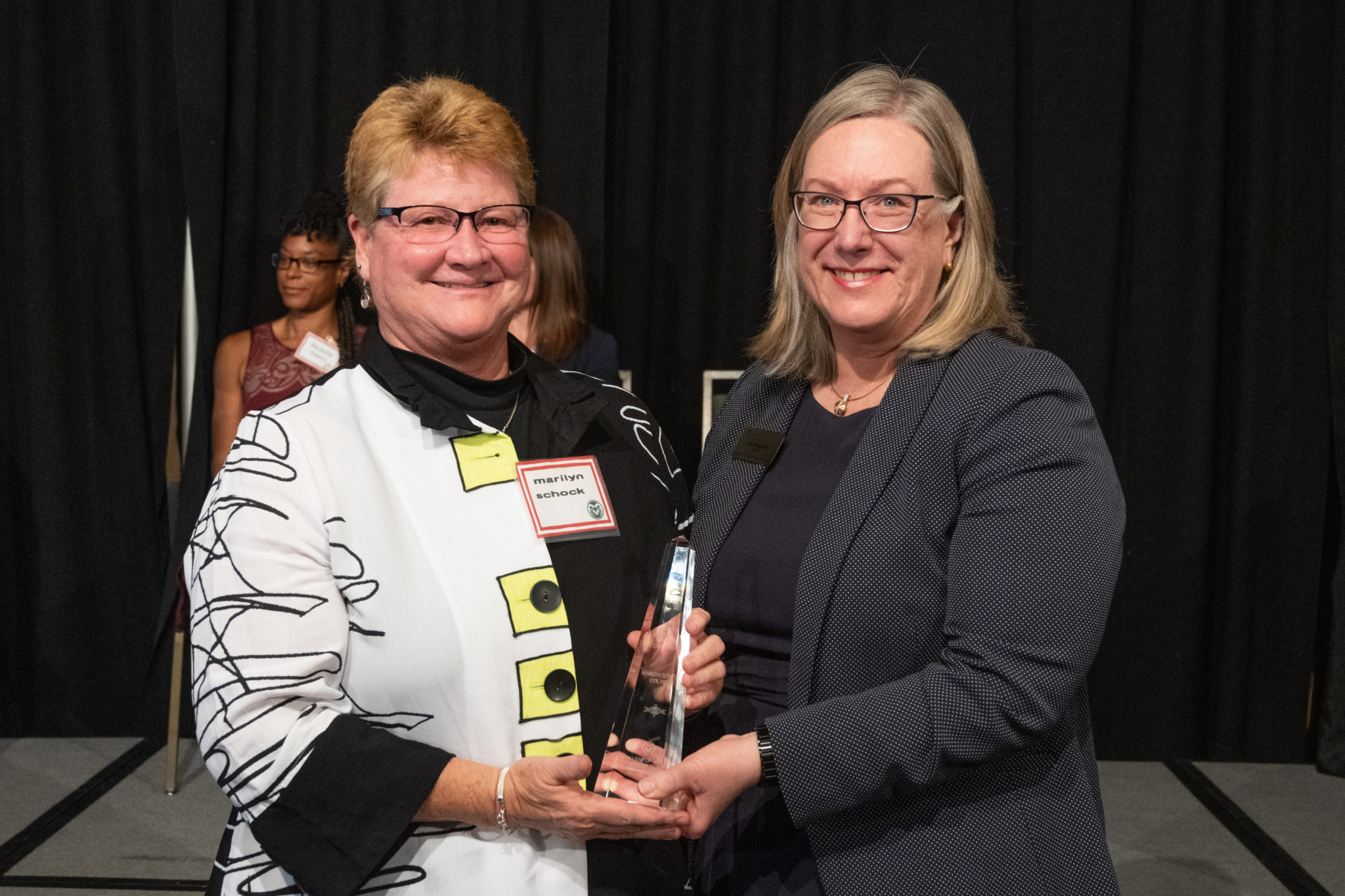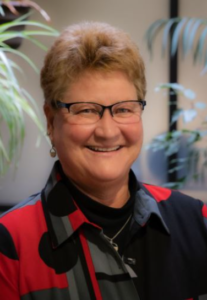
Engaged alumna Marilyn Schock (B.S., occupational therapy, ’85; M.B.A., ’01) shares her perspective as a valued member of the Colorado State University Occupational Therapy External Advisory Committee, providing insights into current healthcare industry needs and future directions. Her deep affinity for direct patient work and her leadership experience as a program builder and hospital administrator help her advise CSU-OT to ensure program priorities align with industry expectations.
Department Head Anita Bundy said of Marilyn’s involvement in the External Advisory Committee, “The purpose of our EAC is to make sure CSU’s OT Program remains cutting edge. Marilyn helps us keep our eyes on what is important in the wider world.”
Schock has applied her education to advance healthcare in northern Colorado for more than 35 years. She has held leadership roles at Banner Health and UCHealth at Poudre Valley Hospital, Medical Center of the Rockies, and now UCHealth Greeley Hospital, where she currently serves as president.
In honor of Schock’s success in the field and guidance to the Department of Occupational Therapy, the College of Health and Human Sciences presented her with a Friend of the College Award at a ceremony on April 19.
Mentors and influences
Raised in Wyoming, Schock’s roots in administration and bedside care run deep: Her mother was a nurse, and her father was an accountant. As a high school student, in the days before public law required full educational opportunities for people of all abilities, Schock was frustrated that her friend with cerebral palsy who loved sports was not allowed to participate in the same physical education class with other students. Her PE teacher agreed, and encouraged Schock to attend an adaptive PE conference, where she heard an occupational therapist speak. This opened her eyes to the profession, launching her educational and career path.
After high school, Schock attended Northwest Community College and the University of Wyoming, with the ultimate goal of enrolling in CSU’s occupational therapy bachelor’s program. Once she arrived, she found mentors who helped shape her education, career path, and personal philosophy, from providing stability to stoking her inner “adrenaline junkie.”
Karen Spencer, an OT faculty member who is now retired, fed Schock’s adventurous spirit with questions like, “How do you adapt a kayak for a person with a prosthetic leg?” Schock appreciated Spencer’s practical application of functionality in recreation for people with disabilities. “Louise White kept everyone grounded. She created an environment where it was safe to learn and experiment,” Schock said of her adviser. Char Ager was a “consummate OT” who used her powerful voice to share what the profession really meant. Christine Davis provided Schock’s first exposure to mental and behavioral health, including an affiliation in a secured psychiatric ward.
After graduating, Schock knew she wanted to stay in Northern Colorado. She was hired at McKee Medical Center in Loveland in a half-time role. “My boss told me I could build programs, and I went to full-time quickly,” she said. She rose to the challenge by developing a rehabilitation program that grew quickly. “I kept ending up in leadership roles,” she said.
While director of rehabilitation, she applied for a job she was already doing, but didn’t get the offer. The candidate who did get the job had a master’s degree, and Schock learned that the degree made the difference. Schock was reminded of her father’s leadership philosophy: “If you’re not at the table, you’re on the menu.”
‘Just watch me’
 Rather than being deflated by this setback, Schock was motivated. “My reaction was, ‘just watch me,’” she said. She decided a degree would not be a factor in the next job she applied for and enrolled in CSU’s M.B.A. program during the early days of CSU Global. “Anytime you can gain education or awareness is advantageous,” she said.
Rather than being deflated by this setback, Schock was motivated. “My reaction was, ‘just watch me,’” she said. She decided a degree would not be a factor in the next job she applied for and enrolled in CSU’s M.B.A. program during the early days of CSU Global. “Anytime you can gain education or awareness is advantageous,” she said.
While she describes her career as non-traditional for an OT, her values and priorities are rooted in her OT education and her ongoing activities. Through career leadership roles in a Physician Hospital Association that provided third-party administration, the managed care side of healthcare, and her hospital operations and executive leadership roles, she has always maintained her OT licensure and certification, even if they were not directly related to her responsibilities.
To stay engaged with the heart of OT, she has volunteered in community care clinics, supporting people using wheelchairs and prosthetics. As an administrator, she has maintained strong ties to the OT staff and patient needs, including responding to patient call lights or assisting with patient care. “This helps me to stay in the know about direct patient-facing OT challenges,” she explained. “As an executive, I always make sure people know I’m an OT. I don’t think I would’ve been successful as an administrator or executive without my OT knowledge to understand what happens clinically.”
Shaping the future of OT education
CSU’s occupational therapy education continues to be innovative and has earned prestige with a consistent ranking among the top 10 programs by U.S. News and World Report – most recently securing the #7 spot. In alignment with professional association standards the OT department is transitioning its master’s program to an Occupational Therapy Doctorate (OTD).
As part of the OT External Advisory Committee, Schock and others provided advice about the characteristics they would like to see in OTD graduates ranging from clinical knowledge to the “soft” skills. Schock applauded Bundy for convening the committee and creating a space for dialogue. “She asked us, ‘how do we need to prepare differently for students tomorrow.’”
Schock was able to answer from the perspective of the customer – the healthcare employer – from both a human resources perspective, and from the clinical perspective. And, drawing from her own experience, she knows an advanced degree can open doors. “The OTD will open doors in different ways, including more executive positions,” she said. “OT is so well-rounded in education; it presents someone in a leadership role who understands the clinical and business sides.”
“It’s been an interesting journey,” Schock said of her career so far. “As I progress through my career, I will probably go back to direct patient care in some capacity. I love the patients.”
Teresa Boynton (B.S., psychology, ’73; M.S. occupational therapy, ’89) was hired by Schock for her first job in OT to manage a water therapy program in an outpatient rehabilitation clinic supporting injured workers. They’ve been colleagues and friends ever since – spanning more than three decades – and Boynton points to Schock’s core belief in OT values as a driver of her success. “Marilyn is helping her employees and patients do what they need and want to do every day. She engenders loyalty among her employees because she puts in so much time and effort and connects with them. She’s not afraid to work hard and do what needs to be done – whether it’s helping to pick up or staying late to manage a crisis situation.”
“My OT knowledge and skills have allowed me to intervene, interact, and engage,” Schock said. “I love what I get to do. I am very blessed and honored to be in this position, and to serve the healthcare team.”
When asked what advice she would give to current or prospective students considering the OTD, she shares her dad’s advice with her own emphasis: “You have to be at the right table to have the right influence to make change.”
The Department of Occupational Therapy is a part of CSU’s College of Health and Human Sciences.